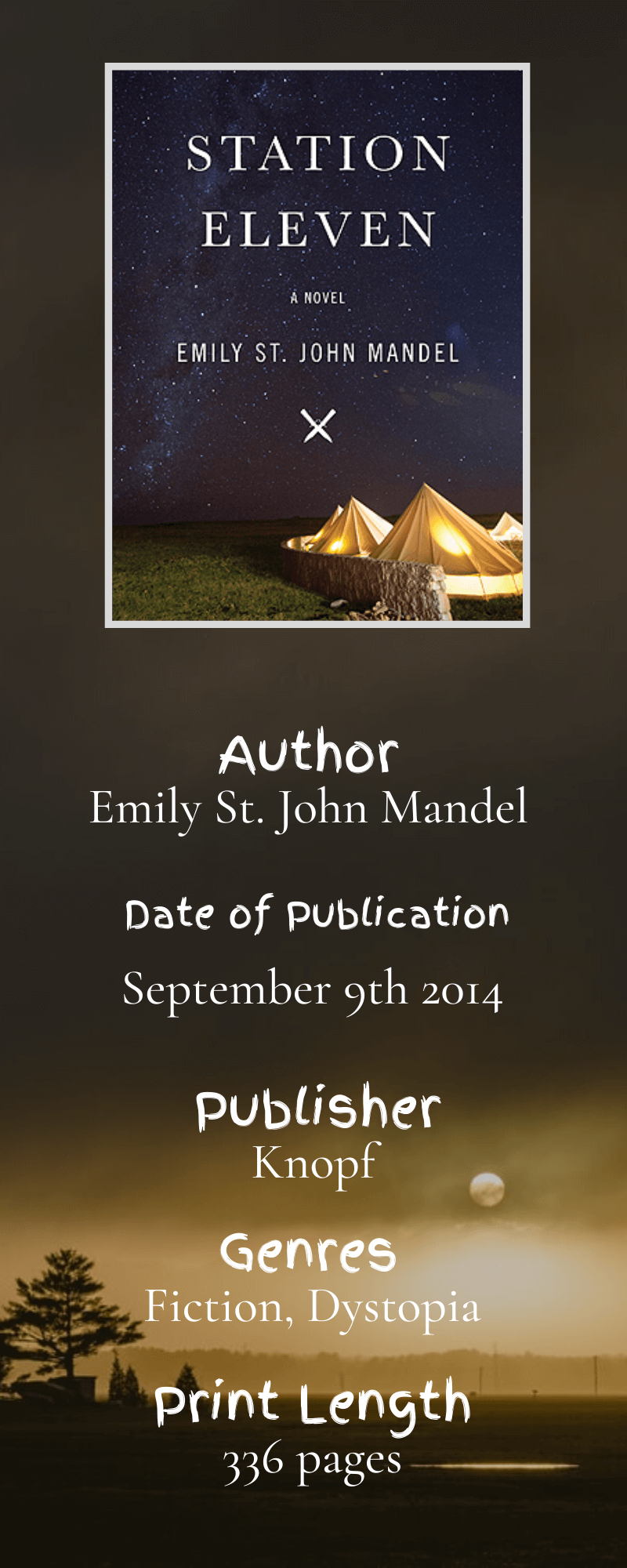
Ariel and I have many buddy reads planned for 2020 and we decided to kick off the year by tackling #ArmedWithABingo‘s ‘a book with a number in its title’ prompt – Station Eleven by Emily St. John Mandel. This book is divided into 8 parts and, using our buddy reading best practices, we read it over the course of two weeks (4 parts per week). We are excited to share our discussions with you! Like we did for The Farm, Ariel’s comments and notes are in red. Let’s start off with the synopsis!
Set in the days of civilization’s collapse, Station Eleven tells the story of a Hollywood star, his would-be savior, and a nomadic group of actors roaming the scattered outposts of the Great Lakes region, risking everything for art and humanity.
One snowy night a famous Hollywood actor slumps over and dies onstage during a production of King Lear. Hours later, the world as we know it begins to dissolve. Moving back and forth in time—from the actor’s early days as a film star to fifteen years in the future, when a theater troupe known as the Traveling Symphony roams the wasteland of what remains—this suspenseful, elegiac, spellbinding novel charts the strange twists of fate that connect five people: the actor, the man who tried to save him, the actor’s first wife, his oldest friend, and a young actress with the Traveling Symphony, caught in the crosshairs of a dangerous self-proclaimed prophet.
Why we wanted to read Station Eleven
I’m really looking forward to reading this book. From the synopsis, the story and dystopian setting within the novel seem to be completely original, and I always love reading stories that have completely new ideas to offer. It’ll be interesting to see how five main characters are balanced throughout the story, and how they develop along with the plot. As I look forward to starting this book, I know I am approaching it with a completely open mind; excited for the adventures that this novel will bring us on 🙂
I think that is a great way to approach one of the first books we read this year! 🙂 You know my fascination with dystopia and the fact that this book has been around for a couple years and I haven’t been able to pick it up until today is exciting – maybe I was waiting to find the right person to discuss it with. George R R Martin is one of my favorite writers and there is a quote from him on the back of my book.
Deeply melancholy, but beautifully written, and wonderfully elegiac…. A book that I will long remember and return to.
George R R Martin
I think we are all on a quest to find stories that we can return to and I am looking forward to this adventure with you.
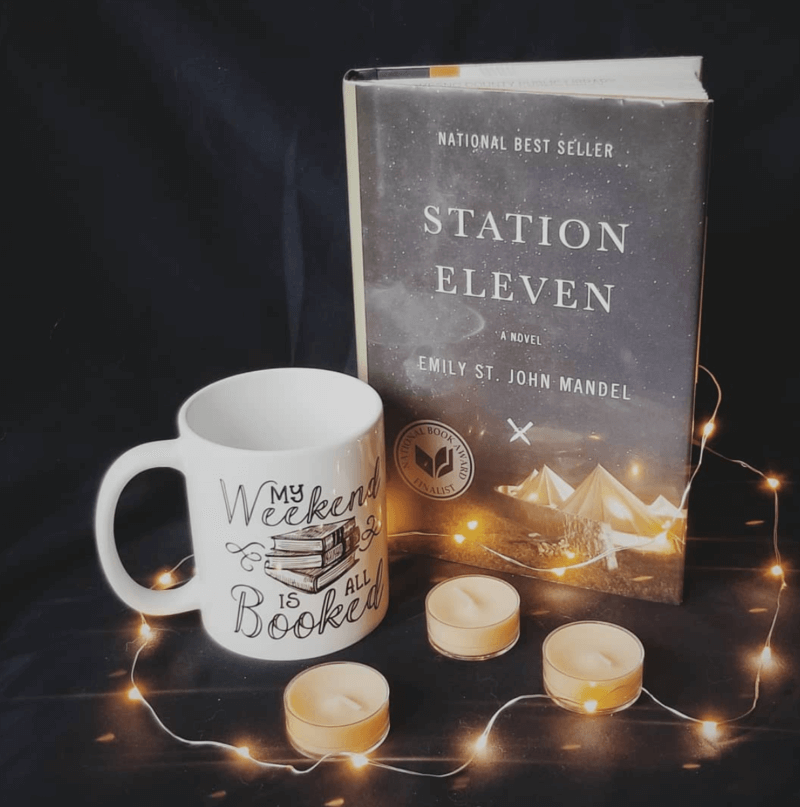
Discussion Part 1
(Parts 1-4, pgs 1-164)
If I had one word to describe this first part of the book, I’d say it’s “atmospheric.” There is a lot of attention placed on the existential aesthetics of the various characters, and these aesthetics seem to be building metaphors for the individual people as they maneuver through the Station Eleven world.
For example, the quote that stood out to me is on page 100 in reference to Miranda realizing the life she built up as a Hollywood star’s wife is about to end:
Miranda’s study window looks out over the side yard, where the lawn terraces down to a pool. Beside the pool stands a lamp from the 1950s, a crescent moon atop a tall dark pole, placed in such a way that there’s always a moon reflected in the water. The lamp is her favorite thing about this house, although she wonders sometimes about the reason for its existence. A diva who insisted on permanent moonlight? A bachelor who hoped to impress young starlets? There’s a brief period most nights when the two moons float side by side on the surface. The fake moon, which has the advantage of being closer and not obscured by smog, is almost always brighter than the real one.
At the moment, I haven’t gotten to know Miranda much past that passage, so I’m not sure what significance has, other than I really love the mood and picture that this passage creates that seems to resonate throughout the book, especially the sentence that I placed in bold.
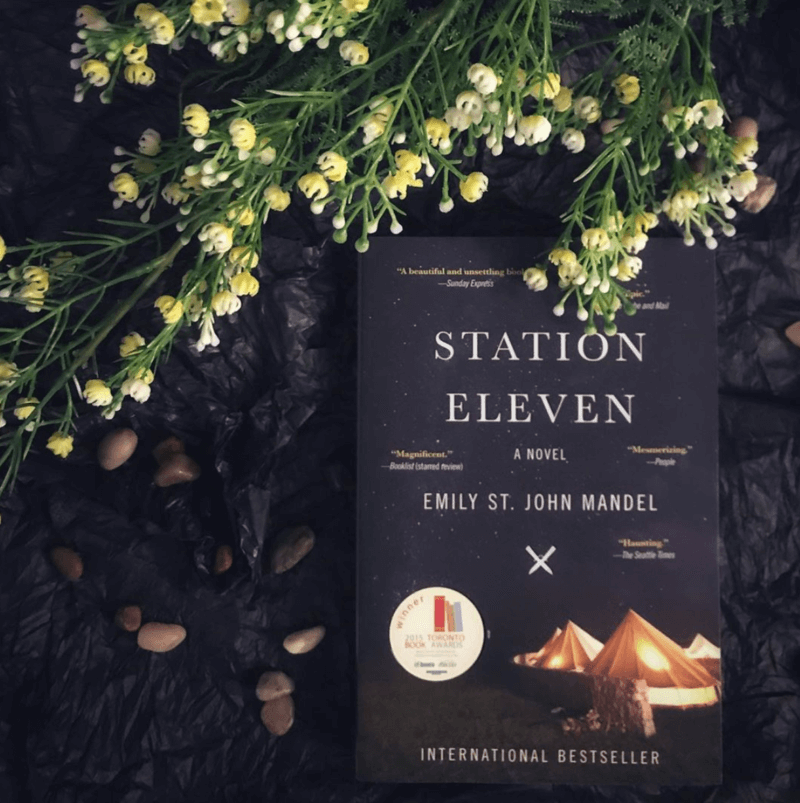
I feel the same and agree with ‘atmospheric’. Even though I did the staging for the book before reading it, the tone of the synopsis and the mystery of what happens to the world came to my mind as I was preparing the photo. Since thinking more about the reading experience criteria, I have started to ask myself why the story is set the way it is – why does it start off with the scene from King Lear, why Shakespeare’s plays are enacted over and over again by the Travelling Symphony. I found the names of the characters quite fascinating, the author is intentionally highlighting some over the other in a unique manner. The world that the author is telling us about is so descriptive and yet so hazy at the same time. It’s like watching something through a snowfall. There’s something obscuring it and I have never experienced this kind of storytelling before.
Overall, this seems to be a different lens through which to view a changed society; a “what-if” everything we know (in the West, at least) changes? Dystopias seem to reflect a lot of what the author believes and hopes and fears about humanity, so I’m excited to continue on and see more of what this book has to say.
Since I have read a lot of dystopias in past years, I have been making some connections with earlier works. While the flu itself reminded me of A Song for A New day, the Traveling Symphony is like the band of people in The Book of M. Both The Book of M and Station Eleven are set in the United States and tell the story, among others, of people traveling in bands, visiting other places, and trying to do more than just survive. In that, many authors share their beliefs, fears and hopes about humanity, that we will not be able to travel anymore, that knowledge will be lost.
So far, I love the different ways in which this story is enfolding. Kirsten’s interview script is quite fascinating as her interviewer tries to bring back newspapers into circulation. They mention a library in their conversation and I have seen this theme before in other stories where books and libraries hold secrets to the world that was.
Yes! I think stories are extremely important in this book, and placed on high value. Keeping these elements in mind will enrich our next section’s reading experience, in my opinion 🙂
I think this is probably the first time in a long time when I have no idea where the story is taking me. I do not know of a conclusion that would make sense. I am just there for the journey.
I completely agree. I am thinking that’s the entire point of a lot of the existential build-up of the motifs of uncertainty, doubt, and anxiety. And at the end of the day, that’s really all we can do; go along with the journey!
Discussion Part 2
(Parts 5-9, pgs 165-333)
The second half of this book continues much like the first– flashbacks and increased character depth, climaxing with the death of the link between all the characters (Arthur Leander). The book begins and ends with his death, coming full circle. I felt very satisfied with the ending, nothing seemed to be left hanging. In the world of Station Eleven, humanity has shifted how they view society and they have adapted to new realities.
I’m not sure why the Prophet was the major point of tension in the second half. My best guess at the reason behind the Prophet as a character was as a metaphorical stand-in for those within humanity who cannot accept these new realities as just a part of human history but rather must ascribe meaning to it. However, this existential exploration didn’t have an enormous impact on my own subjective reading experience.
I felt the same way, Ariel. I liked that the ending was able to connect all the dots – how every single character that we met was connected in the grand scheme of things. I felt that the prophet was not necessary. The story could still have come full circle without that particular role. Unless the point of the prophet was to showcase cult like elements which really weren’t that major part of the plot. I wonder about other ways in which the Prophet would have been offered some insight. Since his teachings were very much based on Christianity, and I have read similar takes in other dystopian novels, I wondered what other narratives are possible, based on other religions. I had not made the connection before I asked Maria that only Abraham based religions have the concept of the apocalypse. I would be curious was dystopias set in religions when Christianity and other Abraham-based religions are not prevalent.
My favorite quote of the second half was this: “‘It just doesn’t make sense,’ Elizabeth insisted. ‘Are we supposed to believe that civilization has just come to an end?’ ‘Well,’ Clark offered, ‘it was always a little fragile, wouldn’t you say?’” To me, this quote seems to encapsulate the entirety of this novel. As readers, we are asked to dwell on small aesthetic details while also journeying alongside characters who have had their entire way of life shattered.
It was indeed quite interesting to see the many perspectives to the epidemic and life After from the very different personalities. Every single one of the main characters tried to stay with their family when hard times started, but eventually ended up somewhere else. I liked that some aspects of life did not change – people still fell in love and got married, people still wanted to be fair and protect the ones they lived with. While Elizabeth represents the people who are optimistic beyond reason, her worldview being shattered in the above quote is just one of the many such incidents that would have marked the lives of other people.
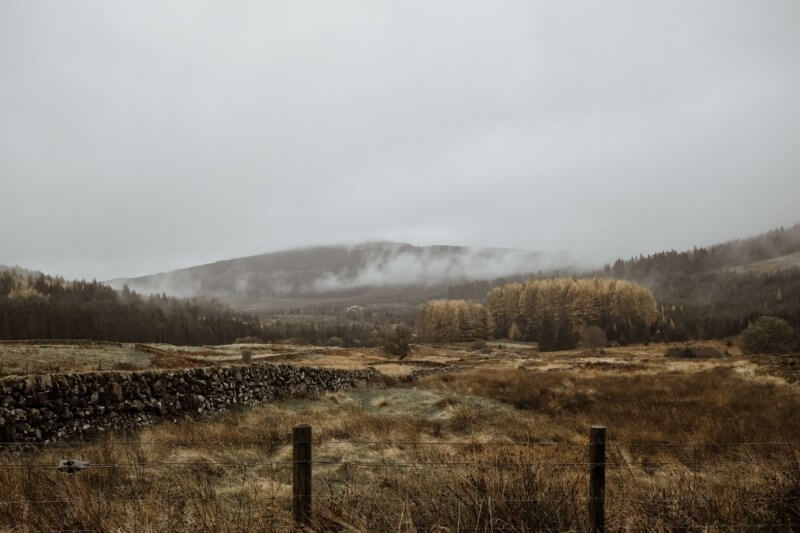
General Discussion
(whole book)
As an existentialist myself, I could appreciate this novel and the philosophical undercurrents that wove in and out between the characters and the plot they navigated. These characters are all equally on a quest for meaning, before and after the plague. The meaning people find within the book vary: radicalized religion (Tyler), theater (Kirsten and Arthur), preserving memories of history (Clark), and a stable life (Miranda and Jeevan)
Generally, I enjoyed the first half much more than the second. In my own subjective reading experience, spending less focus on the Prophet may have made this book have more impact on me. As is, it was a solid take on a popular genre.
Like I mentioned before, I read a lot of dystopias in the last year and, in this second part, continued to see elements of many of the books in this story as well. Ultimately, it does not matter what causes the breakdown of society, whatever kind of epidemic it is. People will survive, form tribes – the way we used to live before city life took over.
What did you think about the title of the book, Ariel? Miranda wrote Station Eleven, a science fiction comic, and Kirsten ends up cherishing it throughout the book. It is a relic of a time past, the dream to live in space but also the artist herself. Did you think it fit the book?
I think Station Eleven was something that created meaning for both Miranda (the creator) and Kirsten (the consumer). They each stood at different points of the plot– the before and the after– and Station Eleven bridged the two. It gave hope and meaning before; it gave hope and meaning after. Thus, while civilization may change, humanity itself doesn’t change too much at the end of the day.
I love that outlook. 🙂
That’s all for our discussion! You know we love describing our reading experience to you! Here is a summary of our read:
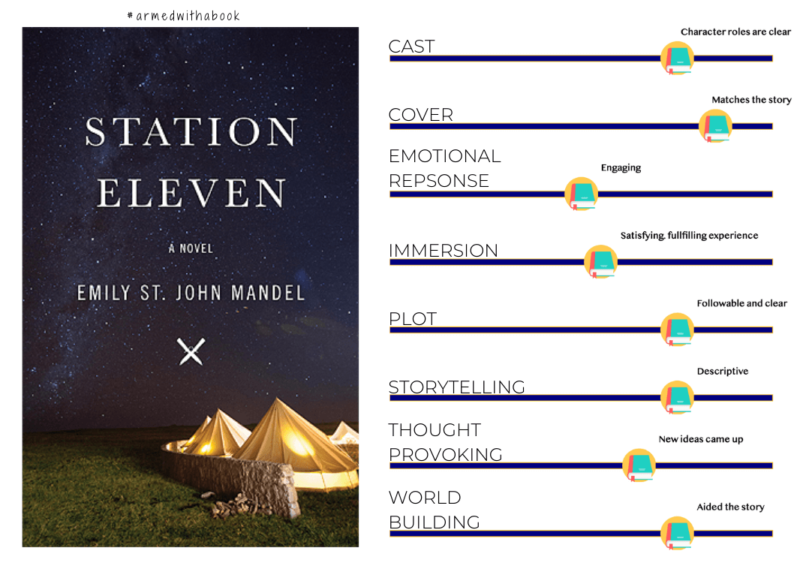
Interested in reading Station Eleven and adding to our discussion? Find it on all retail stores. Here are the Amazon links for your convenience.
Amazon Print
Amazon Kindle
Photo by Quaid Lagan on Unsplash

I just finished reading Station 11 and was fascinated and loved the hopeful ending. Although creeping back to normalcy with electricity somehow being reborn, I did wonder if the future would ultimately bring humanity back to both it’s best and it’s worst attributes.
That’s a great thought to ponder, Corinne! I think with enough time, once survival isn’t an issue anymore, those worst attributes will start to show again. That is not to say that the bad isn’t present without electricity, just the circles of people are more closely knit and would not allow for adversities to happen if they can avoid it. What do you think? Did reading the book during the pandemic lead to any particular thoughts for you? I read this back in January and am interested to learn about your experience. 🙂
[…] have read four out of the eight. Station Eleven (2020) was my first dystopian novel, a book discussion with Ariel during the pandemic. The photo I took of this book is brilliant! Big Little Lies (2020) gave me […]